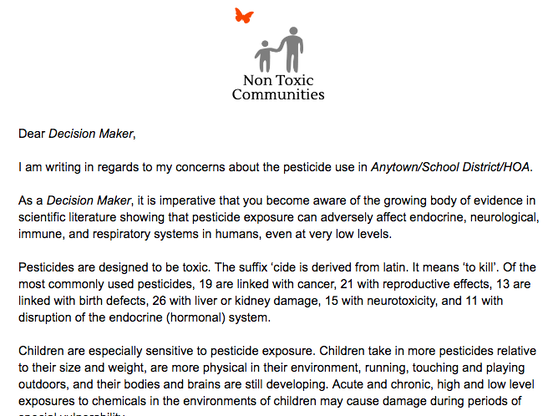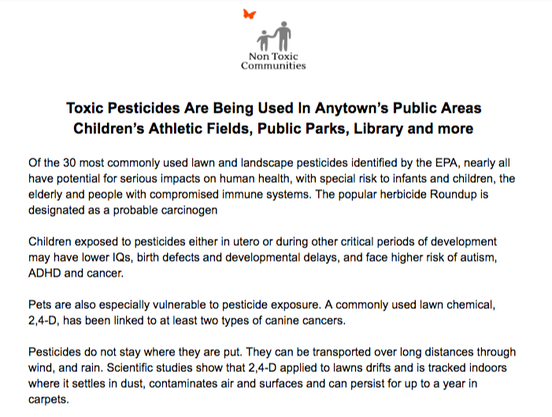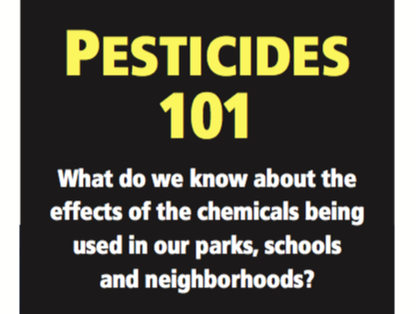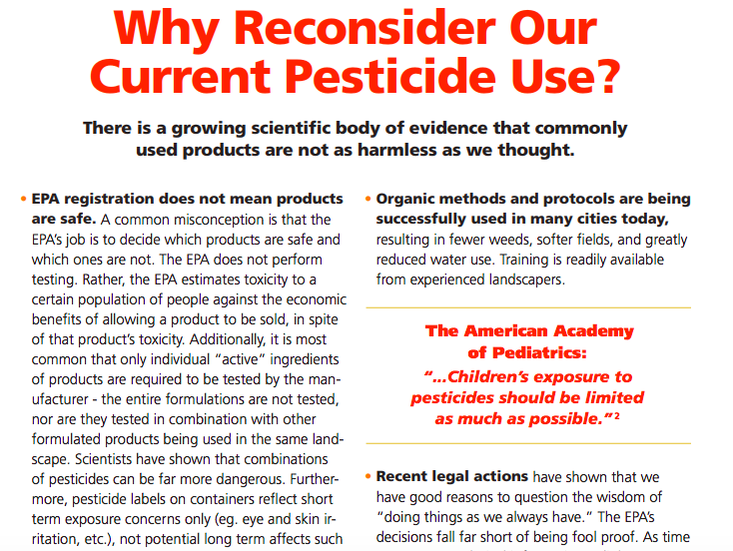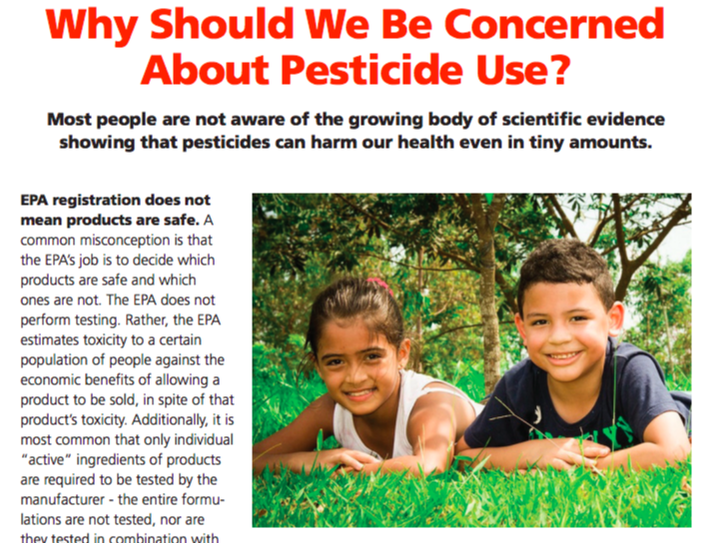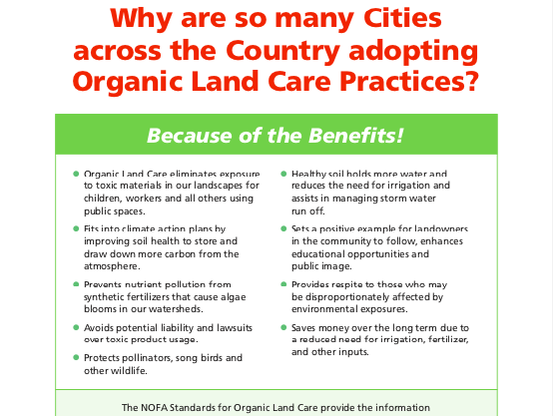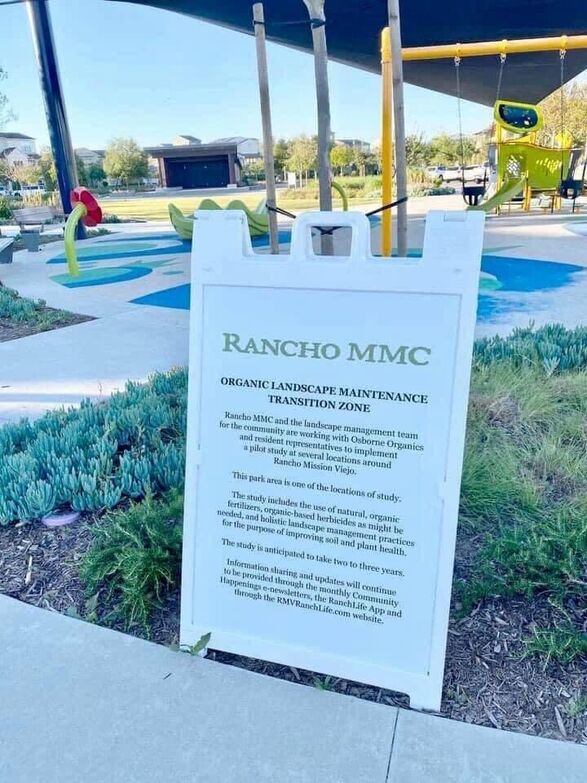Why did it take a group of citizens coming forward for us to recognize that we should be doing this? This is such common sense. - Irvine, California Mayor Christina Shea, upon passing their organic policy
DOCUMENTS FOR CITIES
Download these sample documents to send to your city council, city manager, and other officials. Use the flyer to share information with other residents and gain support.
PESTICIDE FREE ZONES AND POLICIES
Municipalities, schools and universities all over the United States are restricting the use of toxic pesticides to protect public health and the environment. Here's a list of some of the more recent pilots, policies and programs popping up around the country. Is your community next?
Arizona
The Tempe Sports complex is under organic management.
An organic policy, which is patterned on the policy adopted by Irvine, California in 2016, will be phased in a park at a time and the cost will be assessed after a year. Tucson will be the first in the state of Arizona to adopt an organics first policy. Two parks, Gene C. Reid Park, a 156-acre park that serves as a focal point for community activities and gatherings, and Silverlake Park Athletic Field, 51-acre park with little league baseball, soccer, softball, and multipurpose fields are serving as an organic pilot program for the city.
An organic policy, which is patterned on the policy adopted by Irvine, California in 2016, will be phased in a park at a time and the cost will be assessed after a year. Tucson will be the first in the state of Arizona to adopt an organics first policy. Two parks, Gene C. Reid Park, a 156-acre park that serves as a focal point for community activities and gatherings, and Silverlake Park Athletic Field, 51-acre park with little league baseball, soccer, softball, and multipurpose fields are serving as an organic pilot program for the city.
California
- Burbank
CA Homeowners Associations
Eliminated rodenticides.
- Laguna Hills, Moulton Ranch HOA, California
- Talega Maintenance Corporation HOA, San Clemente
- Quail Hill Master HOA, Irvine, California (1,700 homes)
- Linden/Laurel (a Quail Hill sub-HOA) (183 homes)
- Jasmine (also a Quail Hill sub-HOA) (204 homes)
- Laguna Altura (500 homes)
- Rancho Mission Viejo
Colorado
Boulder City is the first locality in Colorado to pass a comprehensive resolution restricting neonicotinoid use on government-owned property. After the 2016 growing season, no synthetic pesticides will be used for landscaping.DeLong Park became the first organic park in the City in 2022.
The city of Longmont is changing its land management efforts to reduce or eliminate the use of pesticides on city-owned land. An organic pilot project began at Roosevelt Park in 2020. Longmont City Council passed a resolution to to reduce or eliminate the use of pesticides on city-owned property and for the city to educate residents about the problems of using pesticides in 2017. In 2017 Parks, Recreation & Open Space stopped using herbicides on city-maintained playgrounds. Staff maintains these areas with mechanical control only. In July 2020 the City Council formally approved an updated IWM plan to restrict the use of some synthetic pesticides like 2,4-D, glyphosate and neonicotinoids.
The city of Longmont is changing its land management efforts to reduce or eliminate the use of pesticides on city-owned land. An organic pilot project began at Roosevelt Park in 2020. Longmont City Council passed a resolution to to reduce or eliminate the use of pesticides on city-owned property and for the city to educate residents about the problems of using pesticides in 2017. In 2017 Parks, Recreation & Open Space stopped using herbicides on city-maintained playgrounds. Staff maintains these areas with mechanical control only. In July 2020 the City Council formally approved an updated IWM plan to restrict the use of some synthetic pesticides like 2,4-D, glyphosate and neonicotinoids.
CO Homeowners Associations
Organic since 2010.
Connecticut
In 2017 Middletown voted to join several other Connecticut towns that no longer allow toxic pesticides on their municipally owned fields, parks and grounds.In June 2022, Norwalk Council approved an ordinance banning the use of non-organic pesticides on all city-owned properties.
In 2021 the City passed an organic community ordinance, restricting toxic pesticide and synthetic fertilizer use in public spaces. Manage organically maintained edible plant and pollinator gardens as part of their landscaping.
In 2021 the City passed an organic community ordinance, restricting toxic pesticide and synthetic fertilizer use in public spaces. Manage organically maintained edible plant and pollinator gardens as part of their landscaping.
Florida
Starting 2019, pesticides and fertilizers will be banned from being used during the rainy season between June and September.
The Key West City Commission voted unanimously to ban herbicides that contain glyphosate in 2019.
In 2019 city commissioners approved a resolution prohibiting the city and its contractors from using herbicides containing glyphosate, including Roundup. IPM policy that restricts highly toxic pesticides and urges pesticide use as a last resort. The city has asked contractors applying for the city’s landscaping business to use organic fertilizer and herbicides, without increasing costs. In 2019 they became the first organic community in the state of Florida. City commissioners voted to ban city use of the chemical glyphosate in 2018. They have directed staff to create an integrated pest management plan to reduce the use of glyphosate with the ultimate goal of eliminating chemicals. Both cities began a pilot in 2020 using all organic means to maintain two parks in each city.
The Key West City Commission voted unanimously to ban herbicides that contain glyphosate in 2019.
In 2019 city commissioners approved a resolution prohibiting the city and its contractors from using herbicides containing glyphosate, including Roundup. IPM policy that restricts highly toxic pesticides and urges pesticide use as a last resort. The city has asked contractors applying for the city’s landscaping business to use organic fertilizer and herbicides, without increasing costs. In 2019 they became the first organic community in the state of Florida. City commissioners voted to ban city use of the chemical glyphosate in 2018. They have directed staff to create an integrated pest management plan to reduce the use of glyphosate with the ultimate goal of eliminating chemicals. Both cities began a pilot in 2020 using all organic means to maintain two parks in each city.
Georgia
A program that began in 2016 is now a food forest with 2,500 pesticide-free edible and medicinal plants on 7.1 acres of land in the Browns Mill neighborhood of southeast Atlanta. The property is owned by the Parks Department and relies on volunteers to help with maintenance. This is the nations largest free food forest.
Hawaii
County Council passed a bill banning the county’s use of herbicides on public property - the first local government in the state to do so. Four county parks launched a pesticide free pilot in 2017 - War Memorial Little League Field in Wailuku, the Luana Gardens playing fields in Kahului, Makana Park in Kuau and the South Maui Community Park in Kihei. In 2021 the County Council voted 8-0 to approve Bill 72 that determines the categories of pesticide and fertilizers allowed or prohibited for use on county property, including parks used for youth sports. Four Seasons is the first fully accredited resort partner of Maui Nui Marine Resource Council’s Reef Friendly Landscaping Certification Program. The resort was awarded Gold Certification for its new efforts to manage the property grounds organically. The Gold Level requires properties to have at least one member of the landscaping team become an Accredited Organic Landcare Professional through the Northeast Organic Farming Association, and document and report all “emergency use” chemicals in case of a pest infestation or outbreak.
Idaho
Pesticide free pilot program at Lillian Woodworth Otness Park adopted 2018 along with Almon Asbury Lieuallen Park. In 2020, the Parks and Recreation Department began a two-year pilot program to reduce the amount of pesticides sprayed in select city parks. The Pesticide Reduction Pilot program expanded to more than 60 parks in 2022.
Illinois
In 2021, it was announced that a number of parks would be transitioning to organic management as part of Stonyfield's #PlayFree initiative, including Grant Park. Almost 90% of Chicago parks avoid spraying weed control chemicals as part of a pesticide reduction initiative spanning 14 years. As of 2019, 30 acres of green space will no longer be sprayed with harmful pesticides. Plans are underway to transition fertilization of all parks to organic by 2020. Three acres of turfgrass on the northeast corner of Lords Park has been designated as a pesticide-free zone by the city of Elgin in addition to over 26 acres of parkland and green space citywide that no longer receive applications of synthetic pesticide. A map of pesticide free zones is available on the City of Elgin website. Restricts use of toxic pesticides on public property in favor of alternative, organic methods. Resolution promoting an IPM policy that restricts highly toxic pesticides and urges pesticide use as a last resort. Lake Forest launched a pesticide-free pilot program at Everett Park in 2023. Four parks began a pesticide free program beginning in 2019. The 2017-2019 Sustainable Parks Initiative will include all playgrounds and eight park locations that will be maintained using organic products and sustainable practices. The eight parks encompass 75 acres. The City of Urbana and the Urbana Park District have just adopted a new lawn care initiative called "Midwest Grows Green," which will include the elimination of all synthetic pesticides on the city building's lawn, as well as reductions at all Urbana parks.
- Pesticide Free Parks Map by Midwest Grows Green
Iowa
Story County Conservation to eliminate the use of chemical pesticides in six of its mowed turf areas. There will be 42 acres of pesticide-free turf in total.
Kansas
Pesticide free parks.
City Commissioners discontinued a mosquito spraying program in 2018 due to resident's input.
City Commissioners discontinued a mosquito spraying program in 2018 due to resident's input.
Maine
List of all municipalities in Maine with pesticide ordinances
In November 2020, 1,412 people voted to pass the pesticide-free ordinance, winning the vote with nearly a 3-1 margin. In 2018 the city of Ellsworth contracted with an organic lawn care company in direct response to a Green Plan submission regarding the hazards of pesticides and herbicides.Councilors in Hallowell, Maine voted unanimously in September 2023 to pass a pesticide ban, which also includes provisions for water testing. The ordinance will stop residents from using pesticides on private property starting in January 2024. Hallowell joins Ogunquit and South Portland in restricting pesticides on private property. In 2014 a ballot initiative passed to ban toxic pesticide use on lawns and landscapes within the town’s jurisdiction. Portland City Council unanimously approved an ordinance that prohibits the use of synthetic pesticides for outdoor pest management on public and private property in 2018. Scarborough Town Council enacted a policy in 2011 to ban the use of certain synthetic pesticides on town property. In 2021 they celebrated their tenth anniversary of being pesticide free. In 2016 became the largest community in Maine to enact a ban on pesticides. In 2023 the City partnered with Maine Audubon to promote the transformation of 100 properties to organic landscapes.
In November 2020, 1,412 people voted to pass the pesticide-free ordinance, winning the vote with nearly a 3-1 margin. In 2018 the city of Ellsworth contracted with an organic lawn care company in direct response to a Green Plan submission regarding the hazards of pesticides and herbicides.Councilors in Hallowell, Maine voted unanimously in September 2023 to pass a pesticide ban, which also includes provisions for water testing. The ordinance will stop residents from using pesticides on private property starting in January 2024. Hallowell joins Ogunquit and South Portland in restricting pesticides on private property. In 2014 a ballot initiative passed to ban toxic pesticide use on lawns and landscapes within the town’s jurisdiction. Portland City Council unanimously approved an ordinance that prohibits the use of synthetic pesticides for outdoor pest management on public and private property in 2018. Scarborough Town Council enacted a policy in 2011 to ban the use of certain synthetic pesticides on town property. In 2021 they celebrated their tenth anniversary of being pesticide free. In 2016 became the largest community in Maine to enact a ban on pesticides. In 2023 the City partnered with Maine Audubon to promote the transformation of 100 properties to organic landscapes.
Maryland
Baltimore, Maryland City Council passed an ordinance in 2020 restricting the use of toxic pesticides (neonicotinoids, glyphosate, chlorpyrifos) on public and private property—including lawns, playing fields, playgrounds, and children’s facilities. Voted to adopt Montgomery County's ordinance in August 2020. The law goes into effect December 1st 2020. Since 2010, all 300 acres have been maintained using organic landscaping practices. Montgomery County banned the use of pesticides on residential lawns in 2015 -- the strongest regulation of lawn pesticides in the country. The ban was challenged by the pesticide industry who seek to remove the right to local control of pesticides. In 2019, the county wide law was upheld by the state's highest court. As of the same year, the county has 45 pesticide free parks.As of 2022 Prince George's will not apply pesticides in nearly 400 playgrounds, parks and dog parks. Voted to adopt the county law in 2017. The Takoma Park, Maryland City Council on July 22, 2013 unanimously passed the Safe Grow Act of 2013, which generally restricts the use of cosmetic lawn pesticides on both private and public property throughout the Maryland city. Voted in 2020 to amend a town article to incorporate Montgomery County law banning the use of certain registered pesticides on lawns by commercial companies and individuals on private property to also apply in the town of Washington Grove.
Massachusetts
The Conservancy is committed to using organic practices.Virtually all of Cambridge’s fields transitioned to organic practices “at least” 10 years ago. They started a new pilot site in 2020. The cemetery staff has confirmed with us that they use only organic maintenance practices on their grounds. Harvard has a fully organic grounds management program.The town of Lynnfield will convert the town common to organic maintenance in Spring 2021.
- Natick
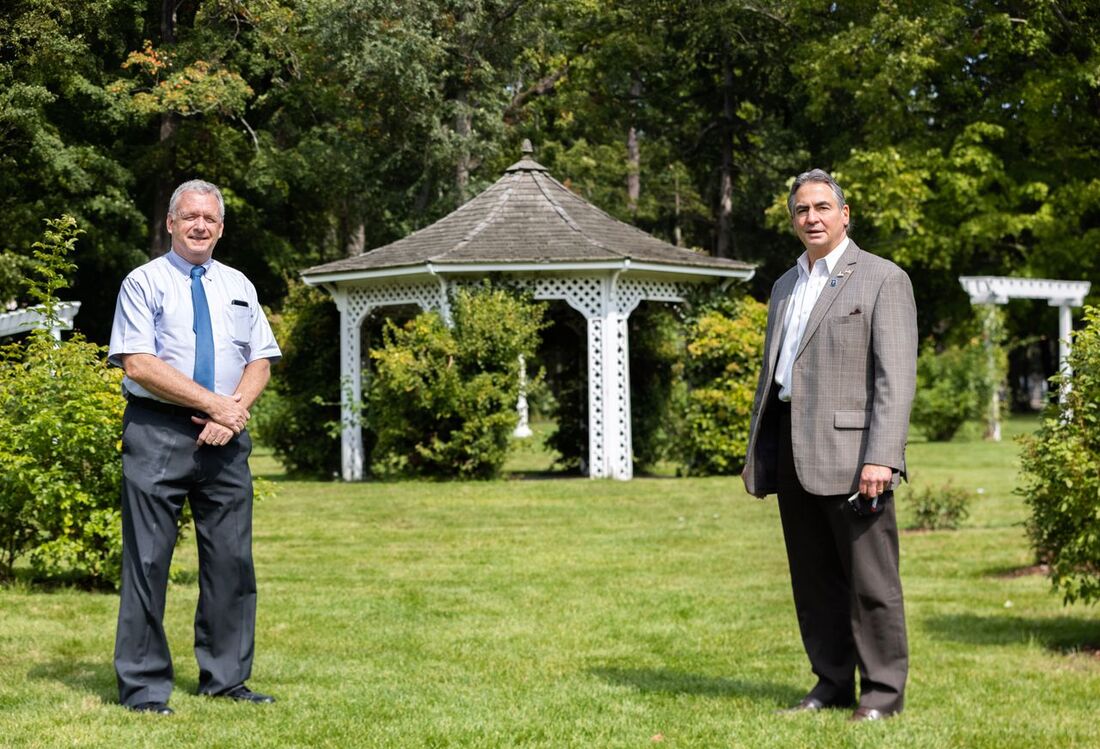
Springfield, Massachusetts City Parks and Buildings Director Patrick J. Sullivan (left) was honored with a lifetime achievement environmental merit award from the U.S. EPA. He credits Mayor Domenic J. Sarno (right) for supporting “Going Green” initiatives and staff for their focus on environmental protection. Sullivan said he is perhaps most proud of the organic lawn care program in the city. Photo by Hoang 'Leon' Nguyen / The Republican. Click picture to read the full news report.
Michigan
Starting spring 2021, Grand Rapids will eliminate the application of synthetic pesticides and fertilizers on Grand River adjacent parks of Sixth Street and Canal.
- Pesticide Free Parks Map by Midwest Grows Green
Minnesota
The City began converting underused turf grass areas to pesticide-free prairie habitat in 2020. The City has a pesticide free parks pilot program.
New Hampshire
The City Council voted unanimously for a commitment to organic land management practices resolution in 2018. Dover uses steam for curbside weed control. The City also uses organic practices for turf grass on all city owned property.Since 2019, the home of the New Hampshire Fisher Cats is the first to be organically managed in all of professional baseball. The City Council voted overwhelmingly to adopt the state’s first ban on toxic pesticides by a municipality in 2017. Instead, the city will use organic products on city sidewalks and in city parks. In 2019, they began using a compost tea machine to enrich the health of their soil.
New Jersey
In 2008 Bernards Township, NJ adopted an Integrated Pest Management Resolution covering all township owned property. The policy utilizes organic lawn care practices allowing for the elimination of synthetic pesticides and synthetic fertilizer on all sports fields and key lawn areas, and it designates all parks as Pesticide Free Zones An Organic Lawn Pilot Program was instituted in 2018. The Chatham Township Committee passed an ordinance in June 2021 to eliminate toxic pesticide use on all municipal recreational areas to promote a healthy environment, protect the public from the hazards of pesticides, and for implementation of sustainable land use.
The township adopted an Integrated Pest Management System and designates public parks as “pesticide free zones”- they have not used any pesticides on municipal property since 2009. The township also passed restrictions on gas leaf blowers in 2023.
Eight organic pilot sites were started in 2020. The City will begin using pesticide-free landscaping for all municipal-owned grounds beginning in 2021.
The township adopted an Integrated Pest Management System and designates public parks as “pesticide free zones”- they have not used any pesticides on municipal property since 2009. The township also passed restrictions on gas leaf blowers in 2023.
Eight organic pilot sites were started in 2020. The City will begin using pesticide-free landscaping for all municipal-owned grounds beginning in 2021.
New York
The Village Trustees banned the use of pesticides on all municipal properties well over a decade ago, according to the Mayor who encouraged residents to go pesticide free in a 2021 opinion piece. In 2021, it was announced that a number of parks would be transitioning to organic management as part of Stonyfield's #PlayFree initiative, including Prospect Park. After a five year moratorium the City Council vote to make a ban on pesticides in parks permanent, with only the exception of emergency situations. Hemlock, Edgemere, Tullamore, Nassau Haven and Grove Park are pesticide free - no neighborhood park in Garden City will have its grounds treated with pesticide as of 2020. In 2020 unanimously voted in an IPM plan that restricts use of synthetic fertilizers, insecticides, herbicides and fungicides. The City has been using “least toxic cultural practices that promote healthy soil and plant life as a preventative measure against the onset of turf and landscape pest problems” since 2009, and began steps to codify this into local regulations in 2023. The village is emphasizing sustainable landscaping further by encouraging mulch mowing, forgoing chemical pesticides and fertilizers and using native trees and plants in landscaping municipal properties, in addition to a gas leaf blower ban. In Spring 2021, it was announced that a number of parks would be transitioning to organic management as part of Stonyfield's #PlayFree initiative, including Central Park. On Earth Day 2021, the City Council voted unanimously to ban the use of chemical pesticides on city property. Eight City demonstration parks will be transitioned to organic maintenance by 2025. Since 1992, the town of Orangetown has a had a policy that prioritizes mechanical methods to remove unwanted vegetation. The policy allows for non-toxic or least toxic chemical controls. The Village of Piermont passed a resolution in 1994 that prioritizes mechanical methods to remove unwanted vegetation. The policy allows for non-toxic or least toxic chemical controls. The County adopted a policy in 1992 that prioritizes mechanical methods to remove unwanted vegetation. The policy allows for non-toxic or least toxic chemical controls. In 2008 they passed a law known as the Rockland County Nontoxic Landscape Maintenance Act.
- Scarsdale
Nevada
Pesticide free parks throughout the city.
North Carolina
In 2021, it was announced that a number of parks would be transitioning to organic management as part of Stonyfield's #PlayFree initiative, including fields in Matthews.
The City has a pilot project at Olsen Park. The use of only organic methods on two ballfields officially began in April 2023.
The City has a pilot project at Olsen Park. The use of only organic methods on two ballfields officially began in April 2023.
Ohio
The village has managed its more than 200 acres of property in and around town without the use of chemical pesticides since 2013.
Banned pesticides like Roundup on city-owned land.
Banned pesticides on public land in 1995.Has a local ordinance that prohibits the use of pesticides on county-owned land. They also have an Integrated Pest Management program.
Banned pesticides like Roundup on city-owned land.
Banned pesticides on public land in 1995.Has a local ordinance that prohibits the use of pesticides on county-owned land. They also have an Integrated Pest Management program.
Oregon
The city has 10 pesticide free neighborhood parks. Laurelwood Golf Course has transitioned away from chemical dependent practices and adopted an organic approach as well. There are several pesticide free parks in the city.The city is making a transition to organic park management beginning with a pilot program. The city is a part of a three-year pilot project to transition to organic park management.
Pennsylvania
In 2021, it was announced that a number of parks would be transitioning to organic management as part of Stonyfield's #PlayFree initiative, including Jordan Park. In 2021, it was announced that a number of parks would be transitioning to organic management as part of Stonyfield's #PlayFree initiative, including Reservoir Park. Beginning in July, 2021 the Department of Parks and Recreation will be required to report pesticide use publicly. In 18 months from passage, the law will prohibit certain toxic chemicals on all city property except golf courses and athletic fields, which must comply by the end of 2022. The city must also develop an organic land management plan that includes regular soil testing and selection of planting. Seven parks will use organic and/or natural landscaping without the usage of chemical fertilizer and pesticides. The Borough has stopped using Roundup in all public places in response to citizen concerns.
Rhode Island
The Providence Parks Department is leading residents by example through eliminating the use of pesticides in parks and playgrounds.
South Carolina
The Town of Kiawah is prohibited by state law from regulating the use of rodenticides. In 2020, town council passed a resolution calling on residents and businesses to voluntarily comply and use non-toxic methods instead.
U. S. Virgin Islands
The Stugas, a senior townhome development near the village of Marine on St. Croix decided to go organic in 2020.
Washington
Pesticide free parks program. A restriction on glyphosate in 2019 is the latest in the City’s work to significantly reduce its use of pesticides since the 70s, including adopting a ban 10 years ago on the use of pesticides at over 250 playfields, picnic areas, community gardens, and play areas. In 2014 Seattle City Council voted to ban the purchase and use of neonicotinoids on the City's property. Seattle currently has 22 pesticide-free parks and several pollinator gardens. The City adopted Land Stewardship Principles in 2023 to guide the development of the Port’s environmental land stewardship efforts for trees, forests, and other habitat. The City of Spokane started working with national nonprofit Beyond Pesticides to adopt organic land management practices at Chief Garry Park in 2020 as a demonstration project.
Wisconsin
Phoenix park was switched to organic management in 2021. Weeds in city playgrounds will be pulled or treated with organic products.
